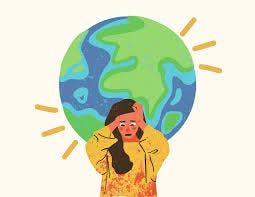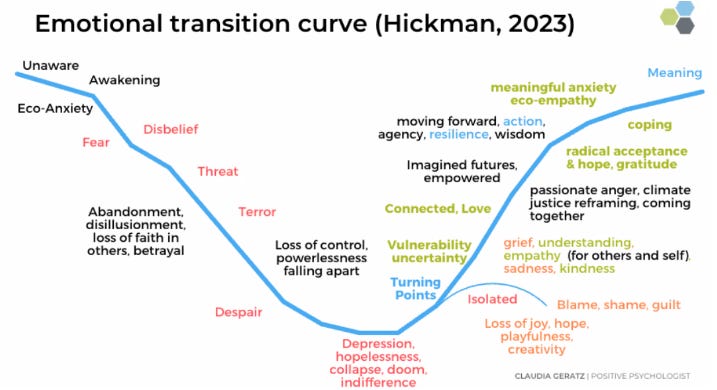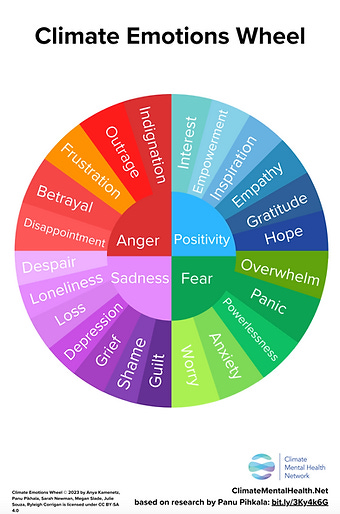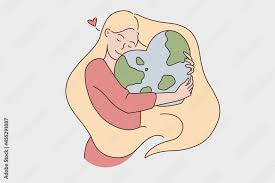I recently spoke on a webinar about transforming eco-anxiety to eco-action and wanted to share here what has helped me to manage my eco-anxiety.
Firstly, what is eco-anxiety? ‘The chronic fear of environmental doom’ - our emotional reaction to the harm happening in the world. And it’s a normal and valid response to what is happening. In a study of 10,000 young people 45% said that worries about climate change negatively impact their daily lives. Searches of eco-anxiety have increased almost 5,000% in the last 5 years. If you have feelings related to what’s happening in the world and it’s negatively impacting your life, you are not alone. It is what makes us human - we hurt because we care and emotions are messengers that need to be listened to and welcomed.
I’ve felt a whole mix of emotions in response to what’s happening in the world including hopelessness, grief, shame, loneliness, despair, overwhelm, frustration, powerlessness, guilt and anxiety. And I have these feelings in relation to all the harm and destruction happening in the world now and predicted for the future (not just climate change).
Over the last few years, having these emotions has looked like me staring at my work screen for hours feeling totally overwhelmed by the scale of the problems and the powerlessness I felt, feeling guilty multiple times a day for not doing enough ‘sustainable action’, feeling like I am not doing enough to ‘save the world’ and feeling shame for my privilege, projecting my frustration, fear and anxiety onto others, feeling lonely, sacrificing my own wellbeing and feeling bad for just existing.
It’s been a journey over the last year to learn how to manage these emotions and be in a better, more positive and more motivated state and feeling more capable of managing any emotions that will come my way in the future. This emotional transition curve from Caroline Hickman shows how we can transition through emotions related to climate:
Eco-anxiety can come from:
Exposure to social media, bad news or reports about real-time disasters, onset changes, hearing about predictions for the future and can lead to feelings of grief, sadness and powerlessness.
Our choices and lifestyle - with more awareness we can end up feeling a lot of responsibility to do the sustainable behaviours and this can lead to feelings of guilt and shame for not doing enough within the system we live in
“Climate grief differs from other forms of grief in that rather than one loss, we experience multiple losses, both past, current and anticipated. Where the pain of a more traditional form of loss may lessen over time, climate grief may keep returning, ever sharp and differently textured, with each new loss. If we can learn to grieve well – making space for it, and knowing that it will not destroy us – we can accept grief as a familiar friend, and that acceptance might allow us to experience a deeper connection to our world. If we can do that, then there is a gift in this time of sadness and anxiety; in surrendering to grief, we can connect to love.”
– Excerpt from chapter 21: ‘Loving, grieving, hoping’ of Climate Change Coaching – The Power of Connection to Create Climate Action
By learning how to better manage our emotions, I believe we can live and work in a more sustainable, joyful and inspired way, that’s better for us and all those around us.
Here are a few of my tips for managing eco-anxiety (which have been helpful for me and they may or may not work for you, I would note most of them require consistent practice and developing an awareness of your thoughts):
Learn to feel the feelings
Feelings are just feelings, it’s our relationship to them that can cause us more pain. We can learn to embrace the emotions, by learning how to identify and name the emotion, locate and describe it in the body e.g. “There is anxiety here. There is a black spiky ball stuck in my throat.” Practice being an observer to the emotion. And then breathe into and welcome it. Practice in times when emotions are less intense so that when you are feeling strong emotions it is easier to tap into. Give yourself space to sit with painful emotions in a non-judgmental way. Emotions will pass more quickly if you genuinely welcome it, than if you resist them. This climate wheel is helpful for naming the emotions.
Gratitude
Look for the good in life, how grateful can you be for the food you have to eat, the bed you have to sleep in, the life you get to lead, the loved ones in your life, the rain, the sunshine. Find the good in the world too, what positive news can you find, what kind of positive future can you dream of? An easy way to do this is to think of 3 things you are grateful for every morning and/or evening. You could also consider a sustainable action you think is a sacrifice or a chore and start shifting your mindset on it to find the joy in it and think of it as a privilege you get to do it.
Self-compassion
Practice speaking kindly to yourself, in all aspects of your life and extend it to the way you talk to yourself about your actions to be more sustainable. I find it helpful to think about how I would like a child to think about their actions in relation to the climate crisis - would I want them to feel guilty and like they’re a bad person for not doing something, or would I want them to feel content and happy with the actions they did take and to do the best they can and to know that’s enough. Negative self talk can add to the pain and the intensity of emotions, so start to notice when you are being mean to yourself and offer yourself some self-compassion, it will release a lot of energy that is spent on feeling bad.
Manage exposure to negative news
You don’t need to know all of the latest news and reports, so you can limit the amount of bad news you consume and increase the amount of positive and good news stories you read. Equally you can notice how people you interact with (online or in person) make you feel and if it’s contributing to negative feelings about what’s happening in the world you can have open conversations, perhaps set some boundaries or create space, whatever feels appropriate.
Practice mindfulness attitudes
Accepting the world as it and not wishing it to be other than what it is, is a powerful way to let go a sense of control over the state of the world (which I have written about here). Things can’t be any other way than they are - and when that lands with us, we can release the emotions and reactions that are trapped in wanting the world or people to be different than it is/they are.
Practicing being in the present moment through meditation, breathing or just consciously bringing yourself back into noticing what is happening in this very moment is helpful to stop us living in the past and future.
“Realise deeply that the present moment is the only moment you ever have”
Eckhart Tolle
Having an open mind, a curious and non-judgemental attitude is a supportive and nurturing way of being for ourselves and for others.
Let go of the guilt
By practicing self compassion you can learn to let go of the guilt and shame that you may feel in relation to the crises. I believe you are doing the best you can with what you are capable of and what your emotional state allows at any given time, so do what you can but let go of the emotional guilt of not doing more than you did and let go of any shame about not being or doing enough - you are enough.
Release a sense of control for the world
Focus on what’s in your circle of control and your circle of influence. Climate change cannot be solved by any one person. You can only control what you do and influence a certain group of people, so you can release the feeling of needing to impact what’s happening in the world. I went from a mentality of ‘save the world’ to ‘save myself’ - I know looking after myself first is the most important thing because the relationship I have with myself, is the relationship I have with the world, so if I can love and care for myself, I will know how to take care of the world and that will ripple out to those around me.
Let you be the guide
What makes you come alive? What are you naturally good at? What are your strengths? Let go of what you think you ‘should’ be doing to save the planet and focus on doing what you love and what aligns with your values. Focus on finding and becoming the authentic version of you. Learn to trust your intuition and let go of the should’s. Seek to find happiness from meaning and move past instant gratification.
Talk about it. Find community.
Find a Climate cafe or an active hope session to talk about your feelings or speak to family, friends or colleagues. If you want professional help, seek out a coach or therapist. You could start up a climate cafe in your organisation or community (here is a template from Force of Nature and Climate Psychology Alliance offer climate cafes and training). Go to aligned events and meet like-minded people and start building your community and know you are not alone.
Take action
It can feel really good to do something to help, however small it is, pick up a piece of litter, choose the loose veg vs the packaged. Taking action and just doing something, no matter how small, can be helpful way to feel engaged and like we are contributing (though make sure you notice and manage any negative voices or feelings in guilt that might arise here). The world will change when lots of people take action, so believe your actions matter because they do.
Never doubt that a small group of thoughtful committed individuals can change the world. In fact, it's the only thing that ever has."
Margaret Mead
Have fun and be playful with it and rest when you need
You only have one life - enjoy it, the world will do better if you show up in the full expression of you. Bring fun, humour and playfulness to your life and work. Dance, hang out with a pet, enjoy the sunshine, whatever makes you happy. Appreciate what you have done, think of all the amazing ways you are contributing and take a rest and a break when you need.
Get out into nature
Reconnect with nature and fall in love with nature. Walking is good for the soul, and noticing the birds, the wildflowers, the trees is a great way to ground yourself, get perspective and be in the present and to remember what it’s all about. I am starting up nature walks and the first is this Sunday 5th May in Surrey, come and join. The next is on the 15th June (do subscribe if you want to get the invitation).
I am sure there are many more ways to manage eco-anxiety, so feel free to comment and add your own and if you want to take some of this forward, start small, pick something/s you think you’ll enjoy and can make a habit and you can make a commitment to yourself on how you can bring it into your everyday.
If you want to experience and learn more about feeling your feelings and developing emotional resilience in these uncertain times, fellow climate coach Molly Stevenson are hosting a webinar on the 16th May at 12-1:30pm BST - sign up here. It will be an interactive space for changemakers and coaches who are passionate about social and environmental impact, but who are experiencing a variety of difficult emotions in relation to what they see unfolding around them – ranging from overwhelm, to frustration and despair. We will create a safe space in which to explore these emotions and, through playful connection with each other and with the natural world, find ways to cultivate the emotional resilience that will enable us to continue doing the work that we want to do.
Sending you much love x







